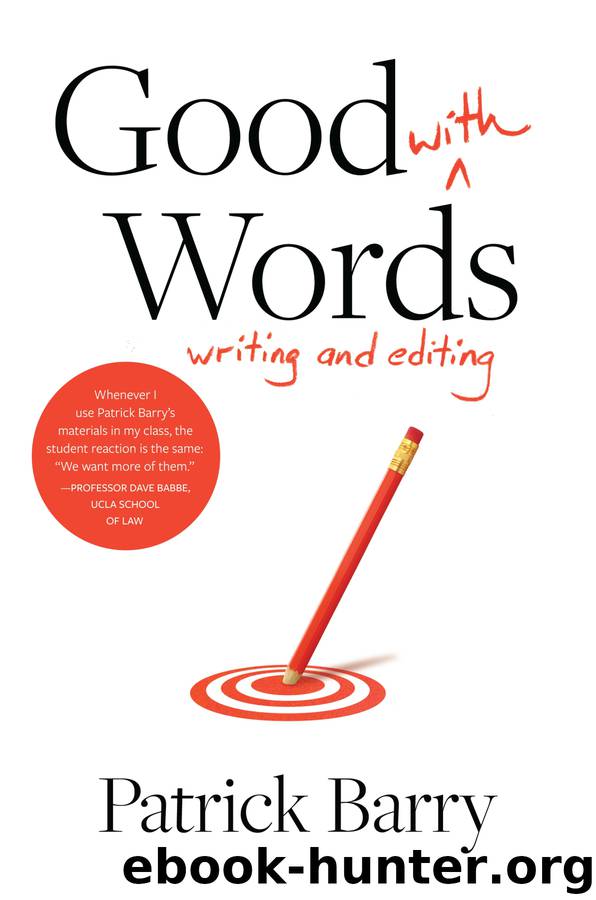Good with Words by Patrick Barry

Author:Patrick Barry [Barry, Patrick]
Language: eng
Format: mobi, epub
Tags: LAN022000 Language Arts & Disciplines / Editing & Proofreading, LAW063000 Law / Legal Writing
Publisher: Michigan Publishing
Published: 2019-05-30T16:00:00+00:00
(1) the seven ingredients that originally made up the drink,
(2) the seven-ounce bottles originally used to sell the drink, or
(3) Grigg’s (largely facetious) boast that it would cure life’s “seven hangovers.”
Nobody knows for sure. All we do know is that as a name, “7 Up” is much, much better than “Bib-Label Lithiated Lemon-Lime Soda.” The other information is uselessly accurate.
Being a Bore
Useless accuracy isn’t the worst problem to have, particularly in an era of “fake news” and “alternative facts.” At least uselessly accurate information is still accurate. Yet this penchant for hyperinclusion, for stuffing writing with unnecessary facts and data, can have significant negative consequences for the intended audience.
Like boredom, for example.
Nothing loses your reader faster—whether she be a judge, a teacher, or a colleague—than an overabundance of details. “The secret to being a bore,” Voltaire wrote back in 1737, “is to tell everything.”3
But being uselessly accurate creates another problem as well, one that can be even more costly in both the academic and the professional world. It leaves less room to be helpfully persuasive, which is often the main goal when it comes not just to writing a legal brief but also to writing an application essay, or writing a grant proposal, or writing all kinds of other documents, including research papers, résumés, and cover letters. When limited by a word or page limit—as students and professionals often are—writing becomes a zero-sum game. Every time you include one word or phrase, you can’t include another word or phrase.
Which is why writers of all kinds might benefit from the “Need-to-Know Principle”: What does a judge (or fellowship committee, or employer, or investor) need to know to decide in your favor? Everything else, delete.
The principle works particularly well with law students and young attorneys. Not in the sense of giving them a precise formula for figuring out what various decision-makers need to know and what they don’t. That kind of knowledge primarily comes with experience, with trial and error, with informed guidance from good teachers and mentors, with time. Rather, the Need-to-Know principle works well in that it helps writers remember that their readers are likely busy people with a lot on their minds and little patience for irrelevant material. “Sentences are attention economies,” the rhetorician Richard Lanham has noted.4 Writing something that is uselessly accurate is therefore not just an affront to style; it is an affront to efficiency.5 It’s giving your readers empty calories. It’s making them use a product with unnecessary parts.
Take this description of a lawsuit’s procedural history. It’s from an appellate brief written by two Michigan Law students who worked in the same unemployment insurance clinic mentioned in chapter 1:
Download
This site does not store any files on its server. We only index and link to content provided by other sites. Please contact the content providers to delete copyright contents if any and email us, we'll remove relevant links or contents immediately.
Seven Steps to Confident Writing by Alan Gelb(858)
Point Made - How to Write Like the Nation's Top Advocates by Ross Guberman(570)
Point Made by Guberman Ross(565)
Point Taken - How to Write Like the World's Best Judges by Ross Guberman(540)
A Primer on Legal Reasoning by Michael Evan Gold(506)
Legal Writing Exercises: A Practical Guide to Clear and Persuasive Writing for Lawyers by E. Scott Fruehwald(503)
Beyond the First Draft: Editing Strategies for Powerful Legal Writing by Megan McAlpin(486)
Plain English for Lawyers, Sixth Edition by Richard C. Wydick & Amy E. Sloan(449)
Thinking Like a Writer: A Lawyer's Guide to Effective Writing & Editing by Stephen V. Armstrong & Timothy P. Terrell(445)
The Complete Legal Writer by Alexa Z. Chew & Katie Rose Guest Pryal(435)
Writing for the Legal Audience, Second Edition by Wayne Schiess(411)
Legal Analysis: 100 Exercises for Mastery, Practice for Every Law Student (2012) by Hill Cassandra L. & Vukadin Katherine T(411)
Legal Writing in Context by Sonya G. Bonneau & Susan A. McMahon(372)
